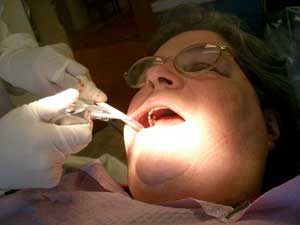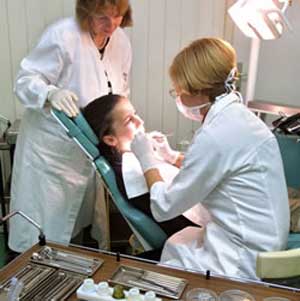Dental Hygienist
Tasks & duties

Dental hygienists work with clinical guidance provided by a dentist or periodontist (a dentist who specialises in treating gum disease). Dental hygienists may do some or all of the following:
-
assess and provisionally diagnose periodontal disease (gum disease)
-
record the medical history of patients
-
examine the mouth, teeth, gums and jaw
-
take and develop x-rays (if they are registered to do so)
-
test saliva for signs of tooth decay
-
recognise and treat periodontal diseases, which involves removing hard and soft deposits such as calculus, stains and plaque from the teeth
-
provide preventive care for tooth decay
-
develop care plans for patients
-
educate patients on the condition of their mouths and how to improve and maintain their oral health
-
make mouthguards for sport and/or stents (a small plastic tray held over teeth to hold in bleach) for home bleaching
-
whiten teeth
-
maintain orthodontic appliances for patients
-
teach and/or carry out research
-
refer patients to dentists or specialists
Specialisations
Periodontal hygienist
Periodontal hygienists treat people who have had periodontal treatment for gum disease.
Orthodontic hygienist
Orthodontist hygienists prevent and treat gum disease in children and young people with braces.
Crown and bridge/prosthodontic hygienist
Crown and bridge/prosthodontic hygienists prevent and treat gum disease in people with dental prostheses. They also help people maintain good oral and general health.
Skills & knowledge

Dental hygienists need to have:
-
the ability to assess oral health
-
knowledge of the structure and function of the teeth, jaw and mouth
-
knowledge of the processes and stages of gum disease and oral health problems
-
knowledge of how to treat gum disease and oral health problems
-
knowledge of a range of oral health care procedures
-
good people and communication skills to explain complex information to patients
-
decision-making skills
-
the ability to assess whether to refer a patient to a dentist or a periodontist
-
problem-solving skills
-
organisational skills
Entry requirements
To become a dental hygienist you need a Bachelor of Oral Health. Dental hygienists must be registered with the Dental Council of New Zealand and hold a practising certificate before they are permitted to practise.
Secondary education
A minimum of Sixth Form Certificate or NCEA-equivalent biology is required. However, people over 20 years old can apply for the Diploma in Dental Hygiene course if they have recently passed the equivalent of a Sixth Form Certificate, or the NCEA equivalent.
Training on the job
Skills are developed on the job. Under the Health Practitioners Competence Assurance Act 2003, dental hygienists are required to attend and participate in continuing professional development. To retain an Annual Practising Certificate, dental hygienists must complete 30 hours of professional development each year.
Dental hygienists are also encouraged to become members of the NZ Dental Hygienists' Association.
Useful experience
Experience as a dental receptionist, dental assistant or dental therapist is useful.
Related courses
Dental Hygiene and Therapy
For more information, please refer to Career Services.
Document Actions
